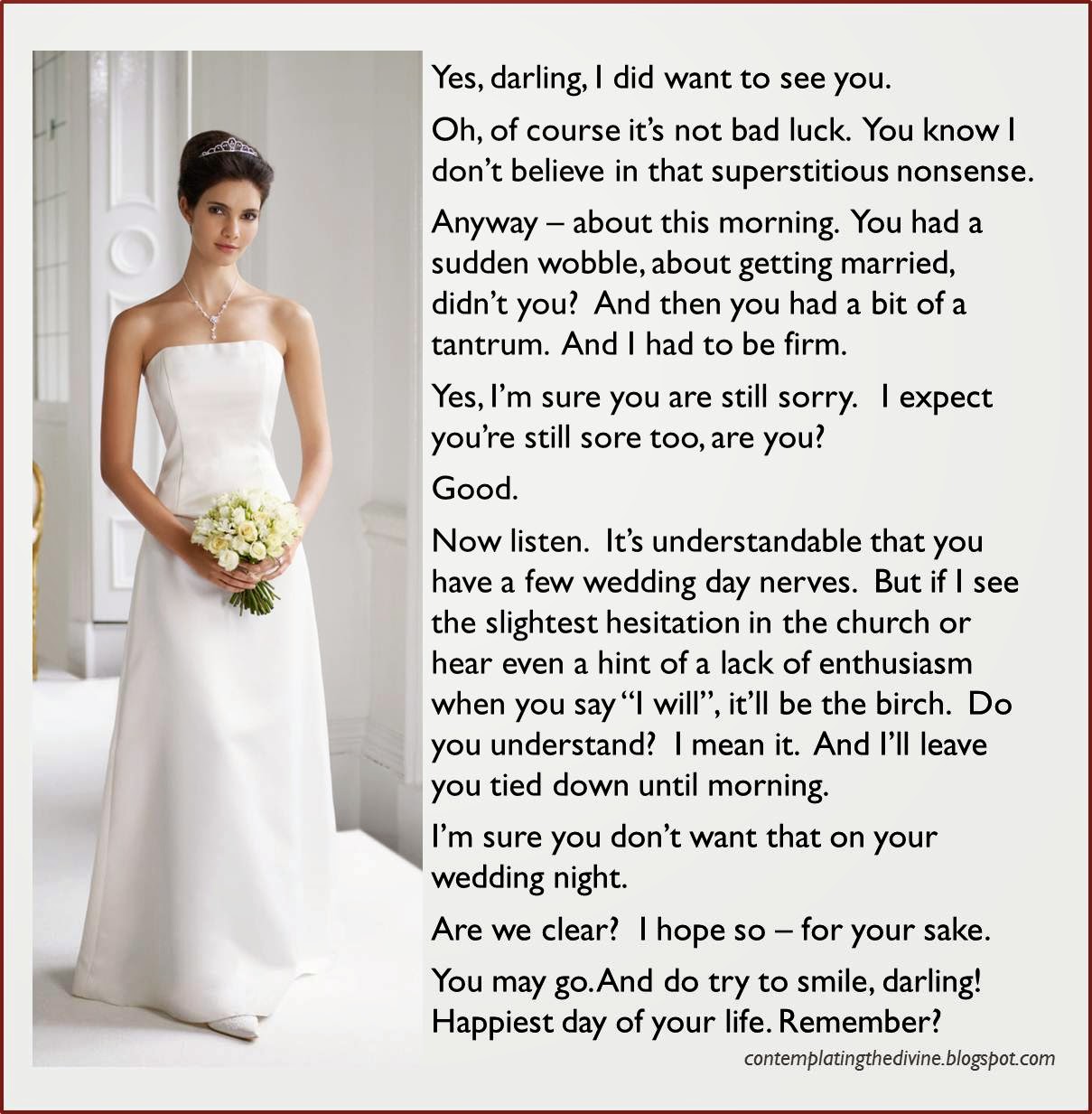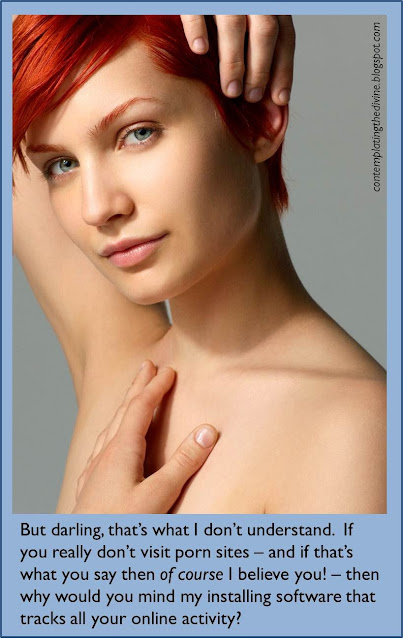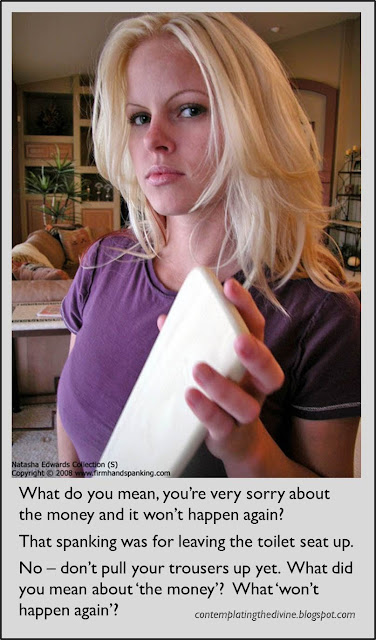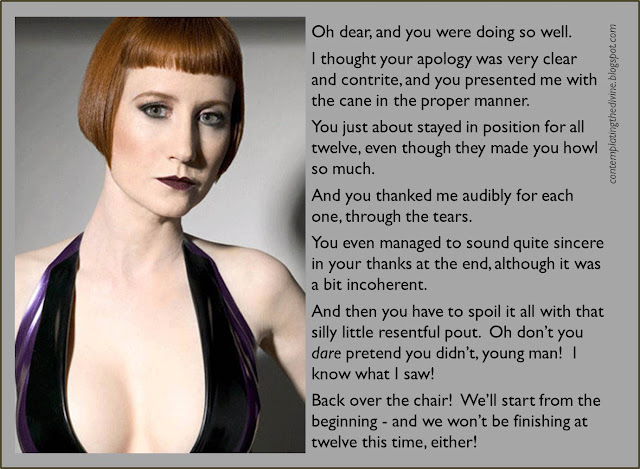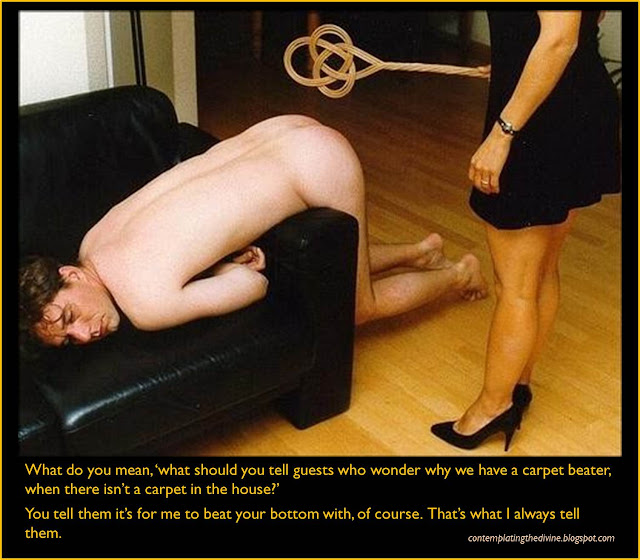In retrospect, Mark wondered how he could have been so
stupid. He’d got carried away. By that book – that stupid book.
He’d been given it by a stranger, shoved into his hand
without a word or a look, just a rapidly disappearing figure in the crowd. And he had the book.
“I am proud to be a
Man!” it was called. It was about
male equality. Equality with women!
It had taken him a while to really understand that. But the book said that men could be the
equals of women – were their equals
if only they knew it. Men didn’t have to
be spanked. Men could choose when to
have orgasms. Men shouldn’t have to wear
sexy revealing clothes for the pleasure of women. On and on – over five hundred badly-printed
pages, bound together with big metal staples, presumably from some kind of
underground press. At first, he thought
it weird and repulsive in its strangeness.
But he found it compelling and read on and on and on – this book, hidden
in the ironing basket where he knew she’d never have reason to look. You are
her equal it said. You are strong. You have dignity. Stand up and say “I am proud to be a man!”
Then one day he came to the fateful section. “Men will never be liberated from oppression,
until women are liberated from oppressing” it declared. It wanted women to come to accept men as
equals. Talk to your wife about male liberation. It said. Read
this book together.
He hadn’t, for a long time.
But he knew that if any husband had a chance at converting his wife to
the cause, he did. Alice was a sweet,
kind person, only seven years older than him, and she treated him well. She whipped him, of course, when he deserved
it, but as a duty not a pleasure. He had
his own allowance to buy clothes. She
usually let him come, once she’d had her own orgasms. Under the influence of that book – that mad
terrible book – he’d half convinced himself that she was a secret male
liberationist already.
So he spoke to her.
And she listened quietly. And she
asked to see the book. She listened
carefully as he turned the pages, and showed her how it demonstrated the cruel
tyranny of women over men, and spoke of a better world. After a while she stopped him and asked just
one question – whether he’d spoken to any of her friends’ husbands about
this. She seemed relieved that he had
not, but asked him to close the book and stop reading at that point. She had taken the book, and gone to phone her
mother.
And then she’d come back and explained how she felt about
this. She did not shout, or threaten, or
punish. She simply spoke, calmly and
steadily, about the importance of household order, about the betrayal that his
secret reading represented to her, about her regrets at how laxly she had
treated him, and determination to correct this terrible error she had made.
And now they do read the book together.
Every Saturday, the book is set on a low lecturn that she
has bought specially for this purpose.
Mark, naked, is tied securely over a whipping bench, so that his face is
just above its open pages. He reads a
page, aloud. It is turned over, usually
with the tip of a cane, then he reads the other side, aloud. She never says anything in response. Once both sides have been read, she begins:
sometimes with strong, deliberate strokes, other times with a flurry of
flicking whippy actions. The whip is
mainly applied to his buttocks and thighs, but occasionally she tends also to
his shoulders, his calves, or whips around to reach the front of his thighs. All of these areas are a mass of weals and
welts, criss-crossed on top of one another.
While his wife is whipping him in this way, Mark must come
up with and carefully articulate five separate, cogent reasons why whatever has
been stated on that page of the book is wrong.
Sometimes this is easy, as the false ideas can simply be countered one
by one, but sometimes the book will be developing a single mad idea of male
equality over several pages, and to come up with five different refutations of
the words on the page can be difficult.
Particularly when Mark is howling in pain, and fighting to gasp out his
carefully constructed arguments in favour of female supremacy.
But it continues until he succeeds in producing five reasons
for treating the ideas on that particular page with the contempt that they
deserve. No matter how long it takes,
eventually he finds five reasons. And
then the whipping ends. She reaches
down, and neatly tears out the page – by now often unreadably stained with
tears and spittle, and he takes it in his mouth, chews one hundred times and swallows
it. That piece of madness has gone, and
only the simple good sense of wifely discipline remains.
Then she usually takes a break – sometimes as short as the
time to have a cup of tea, sometimes as long as a trip to the shops or even the
cinema. Once she visited a friend at
this point in the process, and returned the next day. He remains in place, of course. When she takes a long break, she is careful
to cover the next page with a cloth, so that he cannot rehearse the five
arguments he will deploy next time. For
shorter breaks she does not bother. He
generally finds that it is only under the direct influence of the whip that he
can really appreciate the incoherence and stupidity of the book’s ideas, in any
case. But eventually she returns, and they
do another page. Most Saturdays, they do
three, sometimes four.
Mark has had many opportunities to regret his actions, of
course. He particularly regrets that the
book is so long. They recently reached
the first anniversary of this new regime, and are still less than halfway
through the book. He would one day like
to meet the authors of the book. He
would like to see them bent over this same whipping bench, receiving the same
treatment that he is receiving. And when
they were striped and sore, their backsides ridged and bloody from floggings
applied on top of floggings, when their mouths were bone dry from screaming
hopeless pleadings for mercy, when they start with fear at the merest sound of
Alice’s movements, that could foreshadow an agonising stroke. Then, Mark thought, then he would ask them a
question.
“How proud do you feel right now, to be a man?”
Readers with an interest in the peculiar doctrines of male liberation (or “men’s lib”) might be interested in this, this and perhaps also this. Although, honestly, I can’t imagine how anyone could take this stuff seriously.









